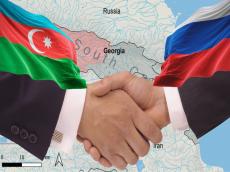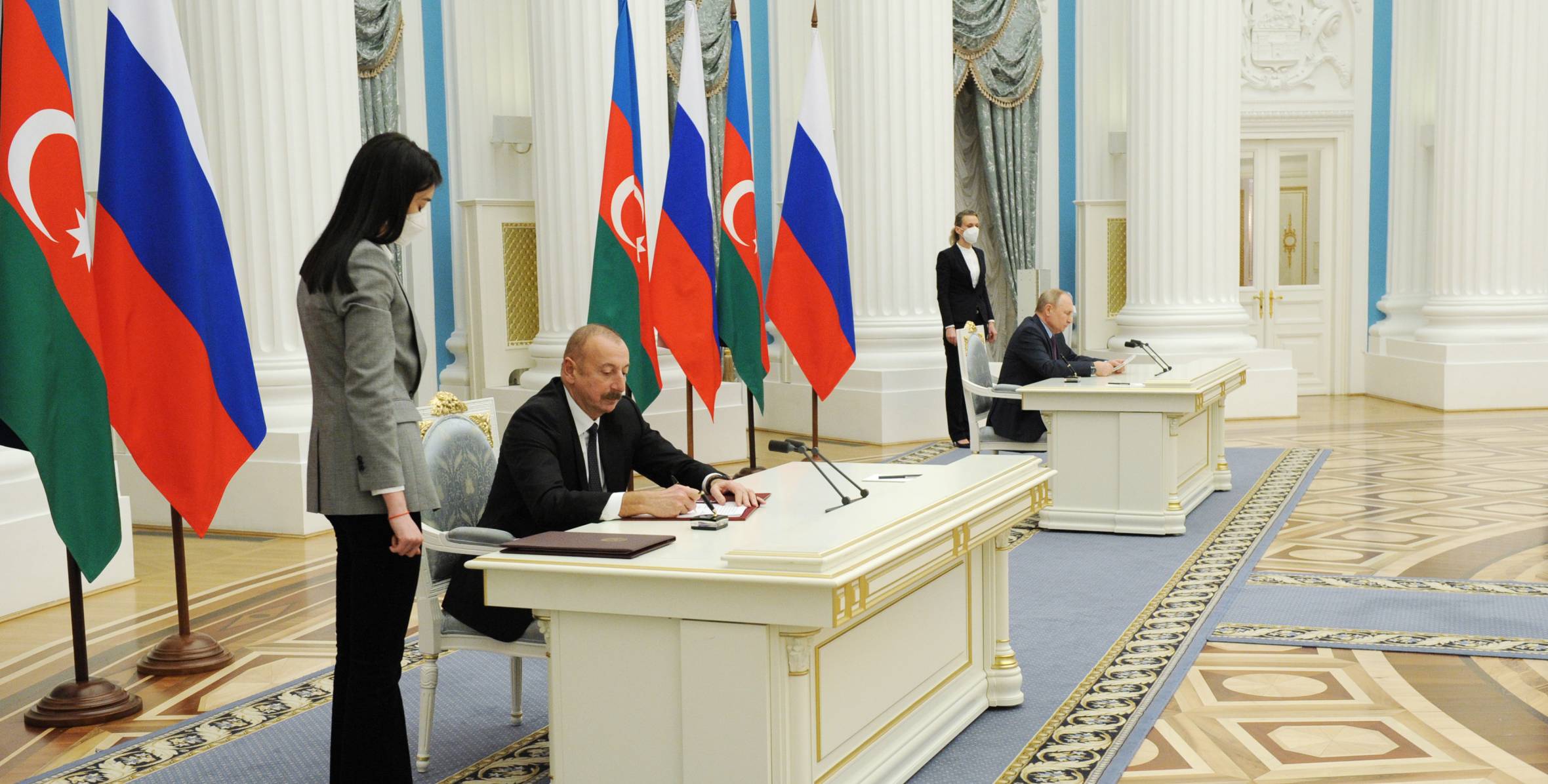|
|
TODAY.AZ / Politics
Azerbaijan-Russia relations overpower misconceptions about future of Garabagh
18 April 2024 [13:30] - TODAY.AZ

Russian-Azerbaijani relations can be presented as one of the most exemplary cooperations in the CIS today. Diplomatic relations between the two countries were established on April 4, 1992, following the collapse of the USSR. In the same year, the Russian Embassy in Baku officially opened.
The main document forming the contractual and legal basis of bilateral relations is the Treaty on Friendship, Cooperation, and Mutual Security signed between the Russian Federation and the Republic of Azerbaijan on July 3, 1997.
However, since the 1990s, the occupation of Azerbaijani territories by Armenia has changed the geopolitical processes somewhat differently. Armenia, which mostly took refuge in Russia's support, began to pursue the policy of expansion in the Garabagh territories of Azerbaijan by using these opportunities for different purposes.
The Republic of Azerbaijan was not very strong economically at that time, but the national leader Heydar Aliyev, who led Azerbaijan at that time, had an influence in diplomacy that was superior to the leaders of Armenia and was even distinguished by his political gravity in the region. Nevertheless, economic opportunities did not allow Azerbaijan to demonstrate its determination on the Garabagh issue. Time was needed for this.
2020 was a turning point for Azerbaijan. A firm push was needed to start a new era. In addition to being unaware of the increase in Azerbaijan's potential, Armenia's eagerness to continue its expansionist policy in the region led to the emergence of new geopolitical realities in the South Caucasus.
Armenia, which was defeated both during the war and in the post-war processes, thought that Russia was still defending them and would "occupy" the Azerbaijani lands and "return" them to Armenia. Not only Armenia, but even many opposing forces and Western forces thought about this.

On February 22, 2022, when Russia and Azerbaijan signed a declaration on allied interaction, many thought that it was just words on paper. However, this approval was an agreement that made Azerbaijan and Russia strong and inseparable allies and led to continuous development.
On October 13, 2022, Azerbaijani President Ilham Aliyev, during the meeting with Russian President Vladimir Putin in Astana, also noted that the relations between Azerbaijan and Russia "have reached the highest level - the level of mutual activity of allies".
Currently, the legal framework between the two countries includes about 200 interstate, intergovernmental, and interregional agreements.
The working mechanism regulating the resolution of specific issues of bilateral relations between the Russian Federation and the Republic of Azerbaijan at the state level is the Intergovernmental Commission on Economic Cooperation.
Further to Azerbaijan-Russia relations, a working group on Azerbaijan-Russia interparliamentary relations operates in the Milli Mejlis of the Republic of Azerbaijan, which was established on March 7, 1997.
According to the Agreement "On cooperation between the Milli Mejlis of the Republic of Azerbaijan and the Federal Assembly of the Russian Federation" signed on April 16, 2001, the Inter-Parliamentary Commission on the cooperation of the Republic of Azerbaijan and the Russian Federation was established. Its working rules are defined by the Regulation approved on October 21, 2004.
Thus, the ongoing alliance between Azerbaijan and Russia finally created conditions for the restoration of complete security in Garabagh. This alliance, which seemed to many to be a myth and was treated with suspicion, finally showed itself recently. Russia's peacekeeping troops deployed to the territories of Azerbaijan in 2020 have completed their mission and decided to leave the country ahead of time. In fact, this decision is logical. Because the task of the peacekeeping mission was only to prevent the threat of Armenian separatism, this became possible. Since there are no more separatist elements in Garabagh, it can be argued that the peacekeeping troops must return to their countries.
Here, one point was clearly reflected in its truest form: the political step taken by Armenia against Russia in return for what it got from Russia in 30 years. Armenia decided to sever its ties with Russia by moving completely towards the West. This radical position completely undermined Moscow's trust in Yerevan. However, according to the document, both the borders and the airspace of Armenia are under the control of Russia, and the fact that the West uses the loophole and intervenes does not give it any reason to have a say in the South Caucasus. Although the West takes the position of just using Armenia as a springboard and conducting its own politics in the South Caucasus, Armenia still imagines the West as its new saviour and submits to its financial assistance. However, this greed of Armenia is a potential threat to the fate of the region in the future. Western powers have never provided help without a purpose, and certainly the plans for the South Caucasus are not limited to Russia but are also the basis of the steps taken against Azerbaijan and Turkiye.
URL: http://www.today.az/news/politics/247288.html
 Print version
Print version
Connect with us. Get latest news and updates.
See Also
- 18 April 2025 [18:43]
Nearly 69 hectares cleared of mines in liberated Gazakh territories - 18 April 2025 [18:20]
Horadiz-Aghband railway line nears two-thirds completion - 18 April 2025 [14:41]
Separatists & Pashinyan - the farce continues - 18 April 2025 [14:31]
Khojaly victim testifies at Baku Military Court: “Madat Babayan’s gang tortured me” - 18 April 2025 [13:42]
Iranian President Pezeshkian to visit Azerbaijan with large economic delegation - 18 April 2025 [12:47]
Trial continues for Armenian-origin individuals accused of war crimes in Azerbaijani territories - 18 April 2025 [11:26]
Hikmat Hajiyev: “Azerbaijan restored sovereignty through correct and successful policy” - 18 April 2025 [11:11]
Collapse of "macaronism": Resignation of the "grey cardinal" of France may cause a chain reaction - 18 April 2025 [10:10]
Pashinyan made mistake that Yerevan regret - 17 April 2025 [15:00]
Azerbaijan, Slovenia forge new business ties with preliminary deals
Most Popular
 Separatists & Pashinyan - the farce continues
Separatists & Pashinyan - the farce continues
 Antalya Diplomacy Forum becomes center of global dialogue
Antalya Diplomacy Forum becomes center of global dialogue
 4SIM signs MoUs with Chinese institutions to boost cooperation in green and industrial technologies
4SIM signs MoUs with Chinese institutions to boost cooperation in green and industrial technologies
 Azerbaijani and Georgian Presidents hold expanded meeting over luncheon
Azerbaijani and Georgian Presidents hold expanded meeting over luncheon
 A fat, nosy and bald hint that Armenia will remove claims against Azerbaijan from the Constitution
A fat, nosy and bald hint that Armenia will remove claims against Azerbaijan from the Constitution
 Foreign diplomats tour liberated cities of Khankendi and Shusha
Foreign diplomats tour liberated cities of Khankendi and Shusha
 Collapse of "macaronism": Resignation of the "grey cardinal" of France may cause a chain reaction
Collapse of "macaronism": Resignation of the "grey cardinal" of France may cause a chain reaction
